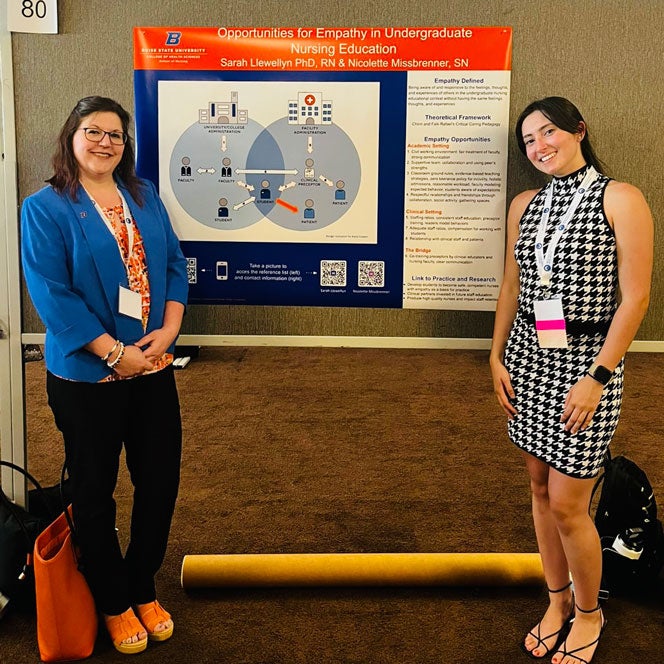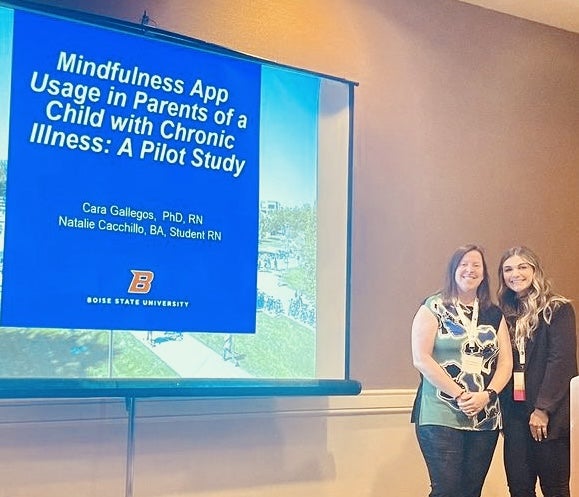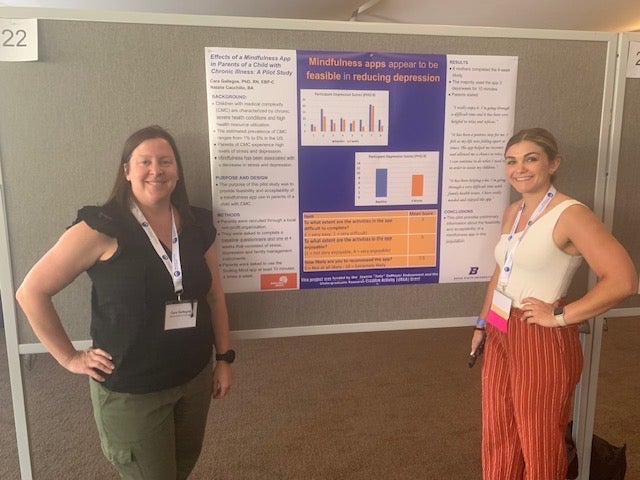Eight researchers – including two undergraduate research assistants – represented the Bronco Nurse community this year at the Western Institute of Nursing conference in Tucson, Arizona.

For undergraduate research assistants Natalie Cacchillo and Nicolette Misbrenner, this was their first time participating in a research conference. They both particularly enjoyed discovering niche areas of nursing scholarship that they previously knew nothing about. “That was my favorite part, just being able to learn more,” Missbrenner said.
The conference also “solidified a lot of my relationships with my professors,” Missbrenner said. “It made it less scary asking for help and knowing that they’re just people, too.”
“The conference was so fun, seeing faculty on a different level than just being a professor,” Cacchillo agreed. “Having those relationships for the rest of my life is going to be so beneficial.”
Faculty researchers in attendance included associate professors Cara Gallegos, Sarah Llewellyn, Renee Walters, Lucy Zhao and assistant professors Jason Blomquist and Ryoko Kausler.
Their research topics included: mindfulness interventions for parents of children with chronic illnesses; integrating self-care into nursing curriculum; models of empathy in nursing education; structuring mentorship for co-teachers; post-operative delirium; remote interventions for women with perinatal depression; and pressure injury risk factors in hip fracture patients.
Conference snapshot
Cacchillo presented a project in a podium session, which was “very intimidating,” she said. “But when the research that you do is interesting and you are passionate about it, it’s very easy to present. So that was a really fun time.”

Cacchillo and Missbrenner were both taken aback by the significance of their work; few other undergraduates attended the conference, much less presented. But undergraduate research assistants routinely represent Boise State among nursing researchers more advanced in their careers.
“To be able to talk to other undergraduate students, master’s students, faculty and doctorate students, but then be treated like their equal, was the coolest experience, Missbrenner said.
Even faculty from other schools invested in Boise State’s research assistants. Missbrenner recounts one professor asking in-depth questions about her poster and offering feedback to help her grow her skills. The perspective of various attendees was significant, she said.
“Everybody just wants to help you learn.”
Thriving as a research assistant
“I didn’t think I was going to enjoy this as much as I did,” Missbrenner said about her job as a research assistant. She admitted there are “tedious moments” in the work, but the conference exposed her to the impact of her work on the field of nursing.
“The research that we do matters,” she said. “I think being able to see your bigger impact, more so than just the frustrations right now, is really cool.”
Although some students may think nursing research is overwhelming or it isn’t applicable to their practice, Missbrenner is quick to disagree.
“I now know so much more than what we’re going over in class,” she said. “[Research] is so eye opening. There’s so much that you can see and learn. I think it’s a great opportunity to help you grow and become more confident in your own abilities because you do have more knowledge than the general population.”

“The research experience is so great,” Cacchillio agreed. “Learning more about specific populations, or increasing quality of care or patient outcomes, it’s just very interesting.”
Missbrenner is incredibly grateful for her research experiences at the School of Nursing. “Boise State has such an amazing program where they’re pushing students – especially undergraduate students – to do so much more than they think that they’re capable of,” she said. “It’s mind blowing to think that you’re doing so much more than what other undergraduate nursing students at other facilities are doing.”
Both Missbrenner and Cacchillo highly recommend students get involved in research. “If you have the opportunity to try to do research, try it,” Missbrenner said. “If you don’t like it, worst case scenario, you quit it. But you don’t know until you do it.”